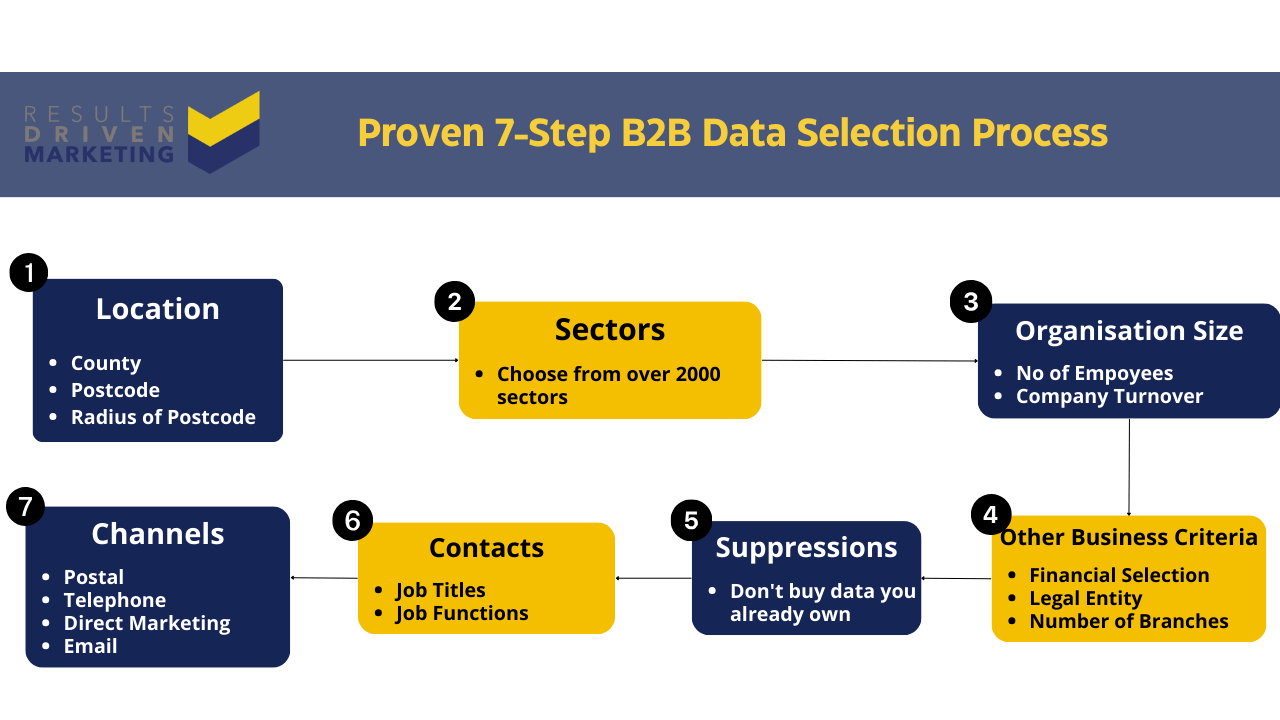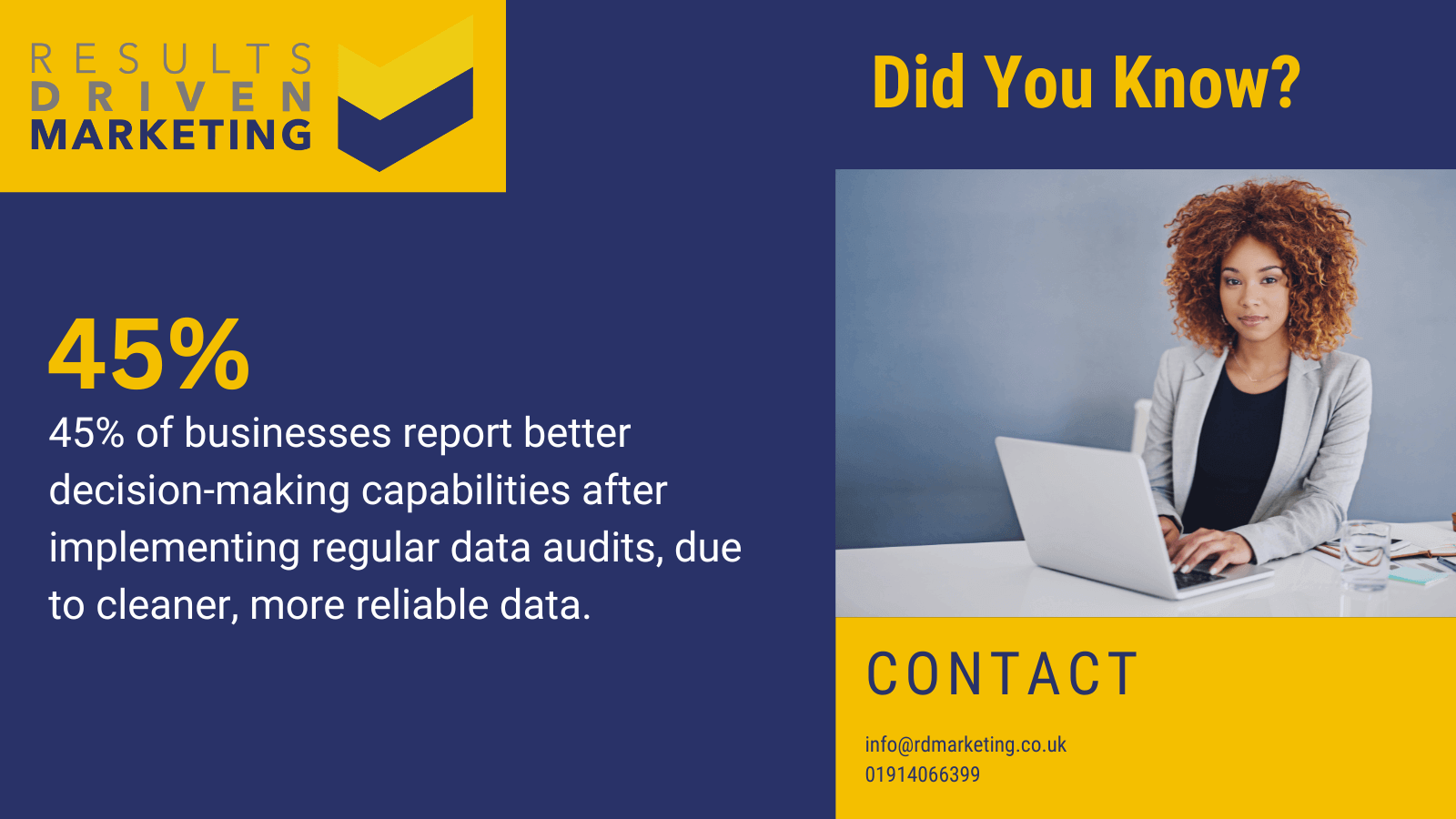
How To Conduct A Data Audit
Conducting a data audit is more than just a best practice—it’s essential for businesses that rely on accurate information to make decisions.
Without regular audits, your data can quickly become outdated or unstructured, leading to a whole host of problems. Whether you’re managing B2B data, direct mail data, or even telemarketing lists, poor data management can result in inefficiencies, poor decision-making, regulatory risks, and ultimately lost revenue.
So, what exactly is a data audit? Simply put, it’s a thorough review of your company’s data to ensure it’s accurate, complete, and compliant. Conducting a data audit allows businesses to take control of their data, clean up any errors, and streamline processes.
For instance, with accurate email address list data, your marketing campaigns will reach the right people at the right time, leading to higher engagement and improved ROI.
Additionally, a data audit ensures your international email lists or consumer data are being used efficiently, making it easier to implement targeted strategies across various marketing channels.
The benefits of conducting a data audit are clear:
- Improved data quality
- Ensured regulatory compliance
- Enhanced business processes
- More effective marketing strategies
If you’re managing vast amounts of data, like B2B telemarketing lists, an audit is crucial for maintaining clean and structured information.
Utilising tools such as data cleansing services or performing regular checks with a CTPS Checker helps ensure that your contact lists are up-to-date and compliant. Services like these not only help streamline your business operations but also drive higher marketing efficiency.
At RD Marketing, we offer tailored solutions to help businesses manage their data more effectively. Whether you need B2B data, email marketing management services, or even data enrichment for missing information, we can help you optimise your data and get the most out of your marketing efforts.
Table of contents:
What is a Data Audit?
A data audit is essentially a deep dive into the health of your data. It’s a comprehensive review designed to assess how accurate, complete, consistent, timely, and relevant your data is for your business needs.
Whether you’re managing B2B data, financial records, or customer information, a data audit ensures that your data remains a reliable asset for your business operations.
Let’s break down the core components of a data audit:
- Accuracy: Is your data free from errors? This includes making sure that contact information, customer details, and financial records are entered correctly. For instance, if you’re managing an email list, you’ll want to confirm that all emails are valid and error-free.
- Completeness: Are there gaps in your data? Missing information—like incomplete contact details in your direct mail data—can hurt your marketing efforts. A data audit helps identify these gaps so they can be filled, ensuring all necessary data points are present.
- Consistency: Does the same data appear uniformly across all platforms? If you have multiple systems or databases, the same piece of data, such as a customer’s address or phone number, should be identical across all of them. Inconsistent data leads to confusion and inefficiencies.
- Timeliness: Is your data up-to-date? Data becomes outdated quickly, especially in fast-moving industries. If you’re running a B2B telemarketing campaign, using outdated phone numbers or contact information can lead to wasted efforts and lost opportunities.
- Relevance: Is the data still relevant to your current business goals? A data audit helps you evaluate whether certain data points are still useful or if they need to be updated, removed, or supplemented with more current information.
Types of Data Audits
Different types of data audits serve specific purposes, and the type you need depends on your objectives and data sources. Some of the most common types include:
Internal Data Audits: These are conducted within the organisation to review the data collected and stored internally, such as operational data, sales information, or internal customer records.
An internal audit could involve evaluating your consumer data lists or international email lists to ensure they’re accurate and aligned with your marketing strategies.
External Data Audits: These are performed by external parties to ensure your data complies with regulatory requirements or industry standards. For example, an external audit might focus on compliance with GDPR or CCPA, especially when dealing with customer data or sensitive information.
Customer Data Audits: This type of data audit focuses on the accuracy and completeness of customer information. It can help identify incorrect contact details, such as outdated emails in your email address list data, or missing demographic information that could affect your marketing segmentation.
Financial Data Audits: As the name suggests, this audit focuses on ensuring that all financial data, such as transactions, invoices, and payment records, are accurate and consistent. This is critical for ensuring regulatory compliance and for making informed financial decisions.
How a Data Audit Identifies Gaps and Risks
A data audit goes beyond just cleaning up your information—it’s also an opportunity to identify any gaps, redundancies, and risks in your data management processes. When you audit your data, you might find:
- Data Gaps: Missing information such as incomplete customer profiles or missing contact details in your direct mail data. This is where services like data enrichment come in handy, helping you fill those gaps by enhancing your existing records.
- Redundant Data: Duplicates can crop up easily, especially if data is entered manually or stored in multiple systems. A data audit highlights these redundancies, allowing you to streamline your records and improve efficiency.
- Inaccuracies: From incorrect emails to outdated phone numbers, inaccuracies in your B2B telemarketing data or consumer data lists can severely impact your marketing campaigns. Regular audits help catch these errors before they cause issues.
By regularly conducting a data audit, you can ensure that your data remains accurate, relevant, and compliant. Not only does this optimise your internal processes, but it also improves your marketing performance and reduces the risk of penalties.
Whether you’re managing B2B data or looking to improve your email marketing management services, a data audit is an invaluable tool for keeping your data assets in top shape.
Why Conduct a Data Audit?
There are countless reasons why businesses need to conduct regular data audits, but the benefits far outweigh the time and resources invested. In a world driven by data, keeping your information clean, accurate, and up-to-date is crucial. Let’s dive into the key benefits of a data audit and why it should be a regular part of your business operations.
Improve Data Quality
One of the primary benefits of a data audit is improving the quality of your data. Over time, data can become messy—duplicate entries, outdated records, and missing information can accumulate without you even noticing. Conducting a data audit helps you:
- Eliminate duplicates: For example, duplicate customer entries in your B2B data can skew reporting and lead to inefficiencies in your marketing campaigns.
- Fix inaccuracies: A thorough audit ensures that the information in your direct mail data and telemarketing data is accurate, reducing wasted resources on wrong addresses or phone numbers.
- Fill in missing data: Sometimes, customer profiles or lead information might be incomplete. With services like data enrichment, you can fill in those missing gaps, ensuring you have a full picture of your contacts.
Statistics back up the importance of data quality. According to Gartner, poor data quality costs businesses an average of $15 million per year. A regular data audit prevents these losses by keeping your information pristine and ready for use.
Enhance Customer Experience
Another key benefit of a data audit is the improvement of your customer experience. Clean, accurate data helps you provide more personalised, relevant interactions.
For instance, accurate email address list data ensures your campaigns reach the right customers with relevant offers. If your data is inaccurate or outdated, you risk frustrating your customers with irrelevant or misplaced communication.
By auditing your data and keeping it up-to-date, your business can offer a more streamlined and customer-friendly experience.
This boosts satisfaction and increases customer loyalty. In fact, businesses that personalise customer experiences see a 40% increase in revenue, according to McKinsey.
Boost Operational Efficiency
Conducting a data audit also leads to better operational efficiency. When data is scattered, outdated, or inaccurate, your team spends unnecessary time cleaning it up or working around these issues. A regular audit helps streamline your processes by:
- Organising data: Ensuring that your B2B telemarketing and other data sources are consistent and clean across all platforms.
- Removing redundancies: A data audit highlights areas where the same data is stored in multiple places, allowing you to centralise and organise your records more effectively.
- Optimising marketing campaigns: Clean data improves the efficiency of your marketing efforts. For example, using high-quality, accurate international email lists ensures your campaigns are reaching active, relevant contacts, saving time and improving ROI.
Many businesses that have committed to regular data audits report significant improvements in their operational workflows. One case study showed that a financial services company reduced their data management time by 30% after implementing regular audits and using data cleansing services.
Identify and Mitigate Risks
Data audits aren’t just about finding mistakes—they’re about identifying risks before they become bigger problems. By conducting a data audit, you can spot potential issues like security vulnerabilities, compliance risks, or operational inefficiencies. Regular audits help you:
- Catch data breaches early by spotting irregular access patterns or errors in security protocols.
- Identify data silos where information is inaccessible to key departments, affecting business decisions.
- Mitigate the risk of poor decision-making caused by inaccurate or incomplete data.
By investing in regular data audits, businesses can avoid costly mistakes, keep their data secure, and ensure a smoother, more efficient operation overall.
Step-by-Step Guide: How To Conduct a Data Audit
If you’re wondering how to conduct a data audit, don’t worry—it’s easier than you might think when broken down into manageable steps. A well-structured data audit helps ensure your business’s data is accurate, compliant, and aligned with your strategic goals. Here’s an easy-to-follow guide that will take you through the entire process.
Set Objectives for the Audit
Before you even begin the data audit process, it’s important to define why you’re doing it. Setting clear objectives will help guide your approach. Is your goal to:
- Improve data quality by eliminating duplicates and outdated information?
- Ensure regulatory compliance with laws such as GDPR or CCPA?
- Enhance customer experience by having more accurate consumer data or B2B data?
By clearly outlining the purpose of your audit, you’ll have a clear focus, whether it’s cleaning your email address list data for an upcoming campaign or ensuring your telemarketing data complies with regulations. Your objectives will determine what you prioritise and how you go about the audit process.
Identify and Gather Data Sources
Next, it’s time to gather all the data your business uses across different systems. Start by identifying where your data lives. Here are some common sources:
- CRM systems: These often hold customer contact and sales data.
- ERP systems: These manage operational data like inventory, sales, and financials.
- Spreadsheets: Many businesses use Excel or Google Sheets for storing data.
- Email marketing tools: Data from platforms managing your email marketing management services.
Make sure you’re comprehensive in gathering data from all corners of the business, whether it’s direct mail data, international email lists, or any internal databases. This ensures that nothing gets overlooked during the audit.
Classify Data
Once you’ve collected all the data sources, the next step is to classify the data. This means organising it into categories based on its nature and use. Common data classifications include:
- Personal data: Names, contact information, and any personal identifiers.
- Financial data: Revenue figures, financial transactions, or payroll information.
- Operational data: Data related to internal processes such as supply chain management, production schedules, or inventory.
- Marketing data: Includes email address list data, telemarketing data, and B2B data.
Classifying your data ensures that it’s easier to audit each category systematically. It also helps identify which sections of your data need the most attention.
Assess Data Quality
Now comes the most crucial part of the audit—assessing the quality of your data. Here’s what you should focus on:
- Accuracy: Are names, email addresses, phone numbers, and other details correct? Incorrect email address list data can lead to low engagement rates.
- Completeness: Are any data points missing? For example, are there missing fields in your consumer data or gaps in your direct mail data? You may need to use data enrichment services to fill these gaps.
- Consistency: Is the data the same across all systems? A data audit helps ensure that the same customer’s information is consistent in your CRM, ERP, and email marketing management services.
- Relevance: Is the data still applicable to your current goals, or has it become outdated? You don’t want to keep irrelevant data that clutters your system.
Use specific metrics to assess each of these aspects, such as bounce rates for email campaigns or missing fields for customer profiles.
Regular audits ensure that your business remains compliant and avoids hefty fines.
Identify Gaps and Risks
As you review your data, you’ll likely find gaps or errors. These can include:
- Missing data: For example, you might find that key contact details are absent in your B2B data.
- Duplicate entries: Duplicates can lead to inflated marketing costs and poor customer targeting.
- Outdated information: Your international email list may include contacts who have changed jobs or are no longer interested in your offerings.
These gaps and risks can severely impact your marketing and business operations, so identifying them is key to maintaining data quality.
Cleanse and Standardise Data
Once gaps and risks are identified, it’s time to take action by cleansing and standardising your data. Here’s what you can do:
- Remove duplicates: Eliminate any redundant entries to ensure that your marketing efforts are efficient.
- Correct errors: Fix any inaccuracies in your direct mail data or consumer data.
- Standardise formats: Ensure that fields like dates, phone numbers, and addresses follow a consistent format across all records.
Services like data cleansing can automate this process and ensure that your data is clean, accurate, and ready for use.
Implement Continuous Monitoring
A data audit isn’t a one-and-done process. To keep your data in optimal condition, it’s crucial to implement ongoing monitoring. This can involve:
- Automated quality checks: Regularly scan your data for inaccuracies or inconsistencies.
- Regular audits: Schedule audits to be conducted quarterly or annually to maintain data hygiene.
- Data governance policies: Implement rules for how data is entered, managed, and maintained across your business systems.
Continuous monitoring ensures your data remains accurate, timely, and compliant over the long term, whether you’re handling B2B data or email address lists.
Tools and Techniques for Data Auditing
Conducting a data audit doesn’t have to be a daunting task, especially with the right data audit tools at your disposal. These tools can make the process faster, more accurate, and easier to manage, whether you’re working with B2B data, direct mail data, or extensive email address list data.
By using a combination of data management platforms, data profiling tools, and audit software, you can streamline your entire audit process. Below, we’ll explore some popular tools—both free and paid—that are designed to help businesses conduct effective data audits.
Data Management Platforms
Data management platforms (DMPs) serve as central hubs where you can store, organise, and analyse your data. These platforms make it easier to track data quality, manage large datasets, and ensure that all your business information is readily accessible for an audit.
- Popular Tools:
- Talend Data Fabric: Talend offers a comprehensive suite for data integration, data quality, and compliance auditing. It automates the entire data audit process and provides advanced cleansing and enrichment features.
- Pros: Powerful automation, excellent data cleansing features, scalable.
- Cons: Can be expensive for small businesses.
- Informatica Data Quality: This tool helps you profile, cleanse, and standardise data, which is especially useful for businesses with diverse datasets like international email lists or consumer data.
- Pros: High-quality profiling and cleansing, integration with other Informatica tools.
- Cons: Steep learning curve.
- Talend Data Fabric: Talend offers a comprehensive suite for data integration, data quality, and compliance auditing. It automates the entire data audit process and provides advanced cleansing and enrichment features.
Data Profiling Tools
Data profiling tools are essential for analysing your datasets to understand their structure and quality. They help you assess how complete, accurate, and consistent your data is, making them a key part of any data audit.
- Popular Tools:
- OpenRefine: A free and open-source tool that’s fantastic for cleaning messy data. It allows you to explore large datasets and correct errors manually or automatically.
- Pros: Free, open-source, flexible.
- Cons: Requires some technical know-how.
- Ataccama ONE: A powerful platform offering both data profiling and data governance features. It allows you to maintain high standards of data accuracy and compliance, perfect for businesses needing regular audits.
- Pros: All-in-one platform, intuitive interface.
- Cons: Paid tool, more suited for larger enterprises.
- OpenRefine: A free and open-source tool that’s fantastic for cleaning messy data. It allows you to explore large datasets and correct errors manually or automatically.
Audit Software
If you’re looking for a tool that focuses specifically on the auditing process, data audit software can help. These tools are designed to provide a detailed view of your data’s quality and compliance with regulatory standards.
- Popular Tools:
- SAS Data Management: A paid tool that helps organisations perform large-scale data audits. It’s built to assess everything from telemarketing data to email address list data, making it ideal for marketing-driven businesses.
- Pros: Comprehensive audit capabilities, great for large data sets.
- Cons: Costly for smaller businesses, requires training.
- Datameer: This software specialises in auditing data for insights and governance. It’s well-suited for complex data environments where compliance is a priority.
- Pros: Easy-to-use interface, strong compliance features.
- Cons: Higher price point, limited customer support.
- SAS Data Management: A paid tool that helps organisations perform large-scale data audits. It’s built to assess everything from telemarketing data to email address list data, making it ideal for marketing-driven businesses.
Pros and Cons of Different Data Audit Tools
- Free Tools:
- OpenRefine and other free tools are perfect for businesses that need flexibility without a significant financial investment. They offer basic functionalities that are suitable for smaller data audits, but they may not have the advanced features needed for large datasets or ongoing data governance.
- Pros: No cost, customisable, good for smaller businesses.
- Cons: May lack advanced features, often requires manual work and technical expertise.
- Paid Tools:
- Platforms like Talend, Informatica, and SAS Data Management come with a wide range of automated features that make auditing data much faster and more accurate. These tools are ideal for larger companies dealing with vast amounts of data like B2B telemarketing lists or international email lists.
- Pros: Advanced automation, scalability, suitable for large enterprises.
- Cons: Expensive, requires training or professional expertise.
Which Tool is Right for Your Business?
Choosing the right data audit tool depends on your business size, budget, and the complexity of your datasets. If you’re a smaller business just starting out with email address list data or direct mail data, a free tool like OpenRefine might be sufficient.
However, if you handle a large volume of B2B data and need to ensure GDPR compliance or require frequent audits, investing in a tool like Informatica or Talend may be well worth it.
Additionally, businesses looking to optimise marketing data for better outreach might benefit from services like data enrichment or data cleansing services, ensuring that their B2B telemarketing or consumer data is always clean and actionable.
At RD Marketing, we offer a wide range of data services to support your audit needs, whether you’re looking to buy accurate B2B data or need assistance with data enrichment. Visit our website to explore our offerings and find the right solution for your data needs.
Common Challenges in Data Auditing (and How to Overcome Them)
Conducting a data audit can be incredibly valuable, but it’s not without its hurdles. Whether you’re dealing with massive datasets, outdated systems, or struggling to ensure compliance, there are several challenges in data audit processes that businesses commonly face.
Let’s break down these challenges and offer practical solutions so you can overcome them and run smoother, more effective audits.
Data Silos
Data silos occur when data is isolated in different departments or systems, making it difficult to get a comprehensive view. For instance, your B2B data might be stored in one system, while your email address list data or direct mail data is housed in another. This can lead to fragmented information and makes conducting a unified data audit quite challenging.
- Solution: Break down data silos by integrating all data sources into a central system. Using data management platforms or implementing data governance policies can help bring everything together. If your data is still scattered, a service like data enrichment can help fill in the gaps across systems and create a unified dataset.
Volume of Data
Dealing with large volumes of data is one of the biggest challenges in data audit processes, especially for businesses with extensive customer lists like B2B telemarketing data or international email lists. The more data you have, the more complex and time-consuming the audit becomes.
- Solution: Leverage automated tools to manage large datasets. Platforms like Talend Data Fabric or Informatica offer automated data cleansing and profiling, helping you manage big data without getting bogged down in manual tasks. Services like data cleansing can also streamline the process by automatically removing duplicates and correcting errors.
Outdated Systems
Many companies rely on outdated legacy systems that lack the modern features necessary for a thorough data audit. These systems often don’t integrate well with newer platforms, making it difficult to maintain data quality across all channels, whether it’s your consumer data or direct mail data.
- Solution: Consider upgrading to modern systems that support automated data auditing and management. If upgrading isn’t feasible, you can still improve audit results by using external tools to cleanse and standardise data from older systems. A service like data enrichment can help you ensure your data remains up-to-date, even if your infrastructure isn’t cutting-edge.
Lack of Clear Data Governance Policies
One of the less technical but equally important challenges in data audit processes is the absence of clear data governance policies. Without set rules on how data should be collected, stored, and maintained, businesses can quickly accumulate inconsistent or inaccurate data. This leads to issues when conducting a data audit, as there’s no benchmark for what “good” data should look like.
- Solution: Implement clear data governance policies to guide how data is handled across all departments. Regular training for staff on best practices for data entry, management, and compliance can also help reduce errors over time. Establishing a governance framework ensures consistency, making future audits much smoother.
Ensuring Compliance with Regulations
With ever-evolving data privacy regulations like GDPR and CCPA, ensuring compliance can be one of the more complex challenges in data audit. Failure to comply can result in hefty fines and damage to your brand’s reputation, especially if you’re working with customer data in global markets, such as international email lists.
- Solution: Automate compliance checks using tools like CTPS Checker to verify that your contact lists meet regulatory requirements. Regularly update your data protection policies, and perform audits specifically aimed at compliance. Services like email marketing management can also help ensure that your campaigns remain compliant with privacy laws.
Poor Data Quality
Lastly, poor data quality—whether it’s inaccurate, incomplete, or inconsistent data—can severely hinder the audit process. This is particularly problematic for businesses dealing with large volumes of customer information, like B2B data or consumer data.
- Solution: Start by conducting a thorough data cleansing process. Services like data cleansing will help eliminate duplicates, correct errors, and fill in missing data. Use tools like Ataccama ONE to automate ongoing data profiling, ensuring that your data remains clean and accurate long after the initial audit.
How Often Should You Conduct a Data Audit?
The frequency of data audits depends on several factors, such as your industry, the sensitivity of the data you handle, and the regulatory environment in which your business operates. For some businesses, an annual audit may suffice, while others may need quarterly or even monthly reviews to ensure their data remains accurate, up-to-date, and compliant.
Let’s break down how often you should be conducting data audits based on these key considerations.
Industry Requirements
Certain industries are more data-sensitive than others, requiring more frequent audits. For example:
- Finance and Healthcare: Sectors like finance and healthcare handle highly sensitive data, often including personal identifiers, financial transactions, or medical records. These industries are heavily regulated and must comply with stringent rules like GDPR, HIPAA, or PCI DSS. For these businesses, conducting quarterly or even monthly data audits is a best practice to avoid compliance risks and ensure data integrity.
- Marketing and Retail: If you’re running a business that depends on accurate marketing lists like email address list data or telemarketing data, a quarterly audit is usually recommended. This ensures that you’re reaching out to the right people and maximising the effectiveness of your campaigns. Regularly cleaning and updating your lists through services like data cleansing ensures your data is always fresh and accurate.
Data Sensitivity
The more sensitive your data, the more frequently you should conduct a data audit. For example, if you manage consumer data that contains personally identifiable information (PII), you’ll need to audit your records more frequently to safeguard against breaches or inaccuracies.
- Highly Sensitive Data: Data like customer credit card numbers, personal health information, or sensitive financial data should be audited on a quarterly basis. Ensuring that this data is accurate and securely stored is crucial for avoiding legal or financial repercussions.
- Moderately Sensitive Data: If you’re working with B2B data or international email lists, you might not need to audit your data quite as often—semi-annually could suffice. However, frequent audits will still ensure that your data is relevant and compliant with privacy regulations.
Regulatory Environment
The legal landscape is constantly evolving when it comes to data protection. Compliance with laws such as GDPR, CCPA, and others should heavily influence the frequency of data audits. Regular audits ensure that you’re up to date with the latest regulations and not accidentally storing non-compliant data.
- Compliance-Heavy Industries: Businesses in regulated industries, or those dealing with international clients, must remain vigilant. An audit every quarter will ensure your data complies with evolving data protection regulations. Tools like the CTPS Checker help verify whether your telemarketing or email lists are compliant, preventing any legal penalties.
Continuous Monitoring and Periodic Reviews
While performing scheduled data audits is essential, it’s equally important to maintain continuous monitoring between these audits. Implementing a system of continuous data monitoring allows you to catch discrepancies, errors, or compliance issues as they arise, rather than waiting for your next scheduled audit.
- Automated Data Monitoring: Automated systems can flag inaccuracies, duplicate records, or outdated information in real-time, ensuring that your data remains clean and useful. This is particularly important when managing large volumes of data, such as B2B telemarketing records or direct mail data.
- Periodic Reviews: In addition to continuous monitoring, periodic reviews (monthly or bi-monthly) can help ensure that your data remains in line with your company’s strategic goals. Whether you’re adjusting your email marketing management services or updating your B2B data strategy, these reviews ensure that your data supports your evolving business needs.
What’s the Right Frequency for Your Business?
- Quarterly Audits: If your business handles highly sensitive data or operates in a heavily regulated industry, quarterly data audits are a must. This ensures you’re staying compliant with the latest regulations and that your data is of the highest quality.
- Semi-Annual Audits: If your business handles moderate volumes of consumer data or B2B data, a semi-annual audit may suffice. These audits will ensure your data remains accurate and up-to-date for marketing and operational purposes.
- Annual Audits: For businesses with less critical data or those operating in non-regulated industries, an annual audit might be all that’s necessary. However, even with annual audits, implementing continuous monitoring will help prevent data issues from accumulating.
As well as….
Conducting a data audit is not just a good practice—it’s essential for maintaining the integrity, accuracy, and compliance of your business’s data. Whether you’re managing large datasets like B2B data, direct mail data, or intricate email address lists, a well-executed data audit ensures that your information is both useful and reliable.
To summarise, the key takeaways on how to conduct a data audit include:
- Setting clear objectives for your audit, whether you’re focused on improving data quality, ensuring compliance, or enhancing operational efficiency.
- Identifying and gathering all data sources, making sure no information is left out, whether it’s from CRMs, ERP systems, or email marketing lists.
- Classifying and assessing your data for accuracy, completeness, consistency, and relevance.
- Ensuring regulatory compliance with laws like GDPR and CCPA, using tools like the CTPS Checker to make sure you’re on the right side of the law.
- Cleansing and standardising your data, utilising services like data cleansing or data enrichment to remove duplicates, fill in missing details, and ensure consistency across your datasets.
- Implementing continuous monitoring and periodic reviews to keep your data clean, accurate, and useful between audits.
Regular data audits are the cornerstone of effective data management. They not only protect your business from compliance risks but also ensure that your marketing campaigns—whether through telemarketing or direct mail data—are reaching the right people with the right message.
Now is the perfect time to start planning your next data audit. Whether you need help managing large datasets like international email lists or you want to optimise your consumer data, RD Marketing can provide the expertise and tools you need.
From email marketing management to data cleansing services, our solutions ensure your data stays clean, compliant, and ready to drive your business forward.
Visit our website to learn more, or get in touch with us to discuss how we can assist you with your next data audit. Don’t wait until issues arise—stay ahead with regular, comprehensive audits to keep your business running smoothly and efficiently.
Who are we?
Thinking about “how do I buy data“?
Providing b2b database solutions is our passion.
Offering a consultancy service prior to purchase, our advisors always aim to supply a database that meets your specific marketing needs, exactly.
We also supply email marketing solutions with our email marketing platform and email automation software.
Results Driven Marketing have the best data of email lists for your networking solutions as well as direct mailing lists & telemarketing data in telemarketing lists
We provide data cleansing and data enrichment services to make sure you get the best data quality.
We provide email marketing lists and an international email list for your business needs.
At RDM We provide b2c data as we have connections with the best b2c data brokers.
A good quality b2b database is the heartbeat of any direct marketing campaign…
It makes sense to ensure you have access to the best!
Call us today on 0191 406 6399 to discuss your specific needs.
Results Driven Marketing
0191 406 6399








